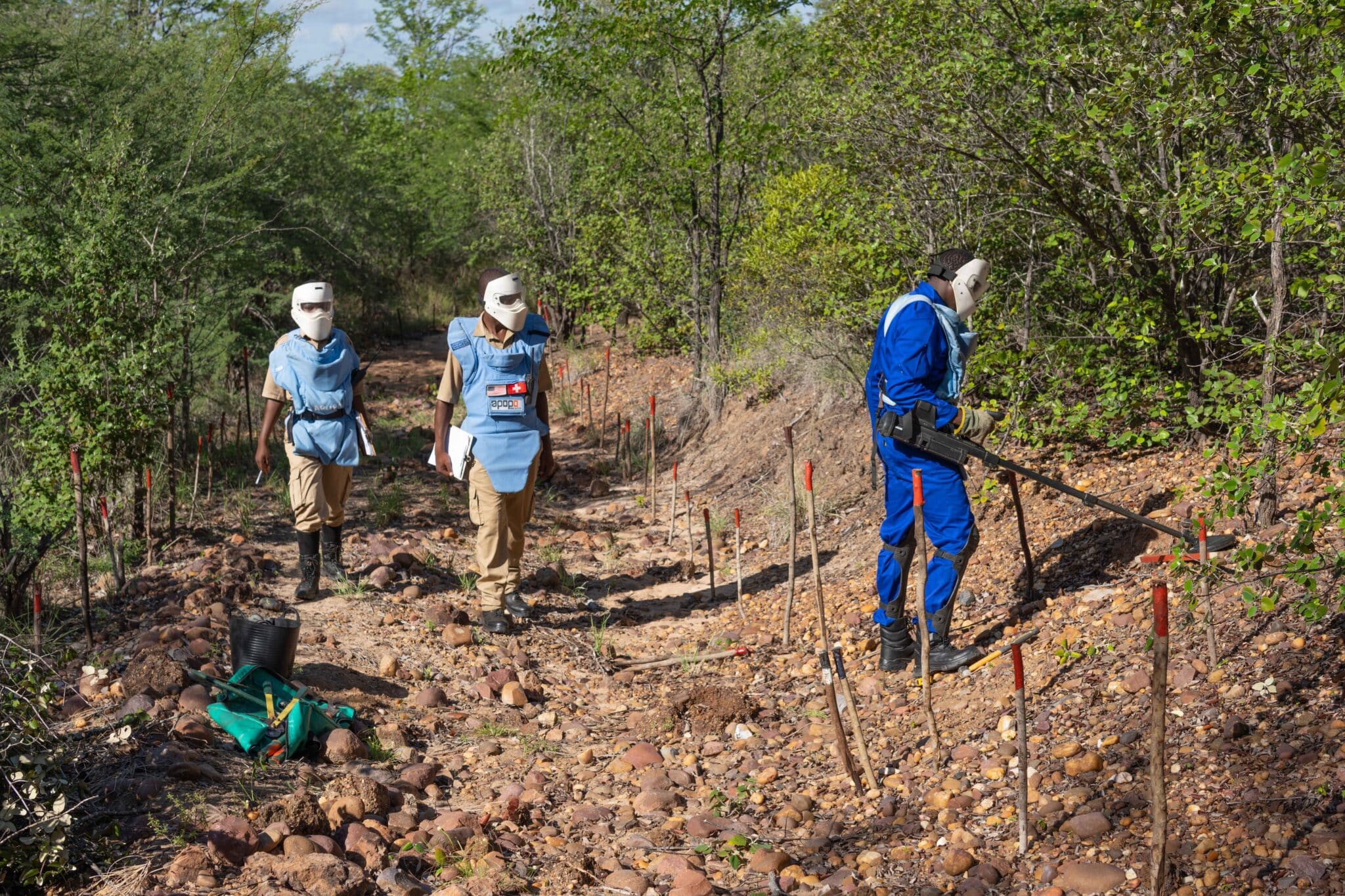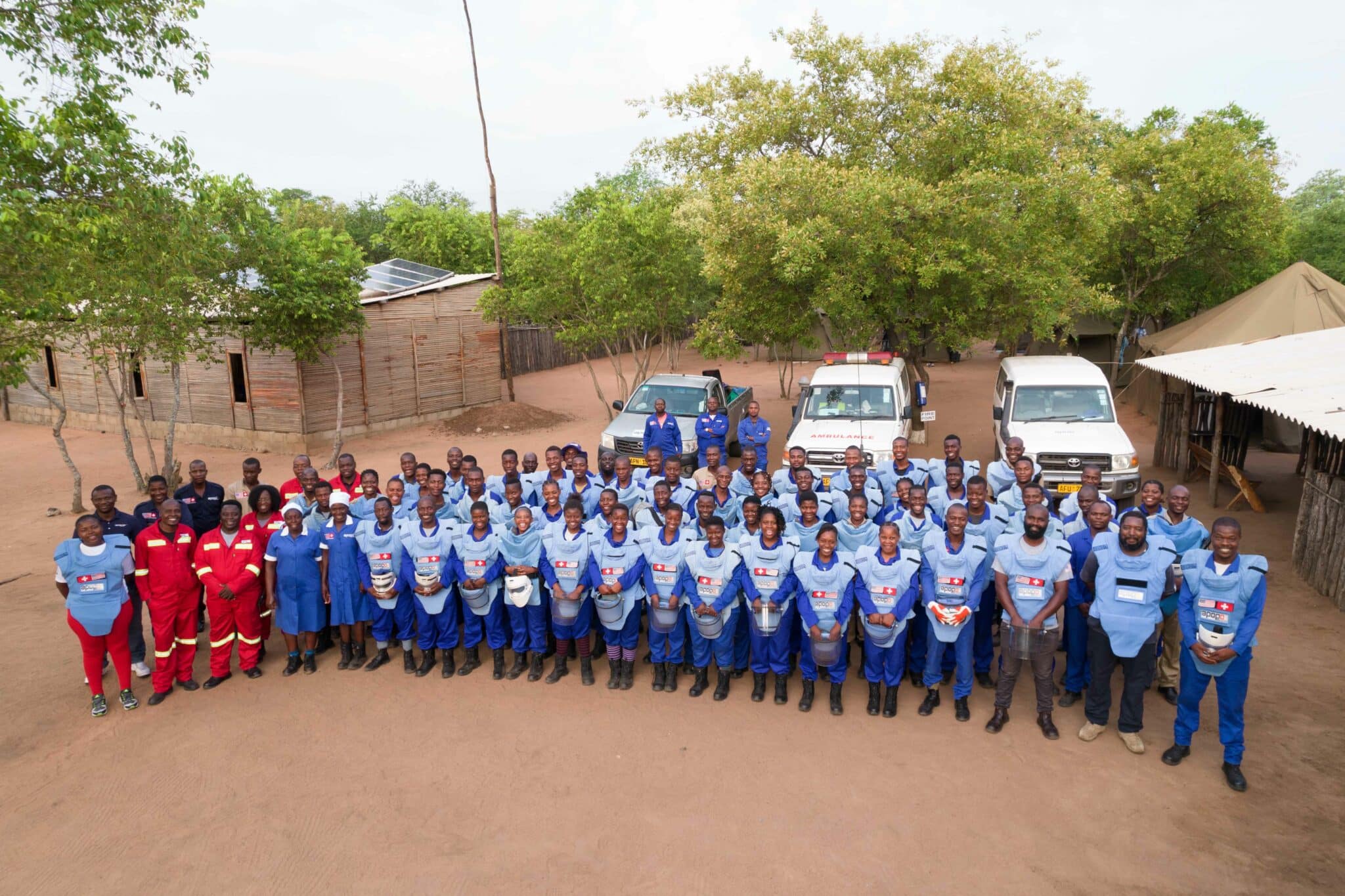APOPO’s Zimbabwe Mine Action Program made significant strides in 2023, clearing a total of 244,731 square meters of land previously contaminated with landmines. Supported by the U.S. Department of State’s Office of Weapons Removal and Abatement (PM/WRA) and the Swiss Agency for Development and Cooperation (SDC), APOPO has been instrumental in demining operations in an area critical for the livelihoods of local communities and the preservation of wildlife.
The Zimbabwe Mine Action Landscape

Zimbabwe is faced with extensive anti-personnel minefields along its Mozambique border, remnants of the Zimbabwe Liberation War between 1964 and 1979. During this period, Rhodesian Security Forces deployed millions of landmines to secure the border with Mozambique. These landmines still pose a deadly threat to civilians, causing death and injury, and hindering economic progress by affecting livestock and blocking agricultural activities. As of the close of 2020, it was reported by the Zimbabwe Mine Action Center that there was 34.1 million square meters (approximately 8,426 acres) of land still contaminated with mines.
The landmines laid have not only threatened human lives and restricted agricultural development but also wildlife conservation and ecotourism. APOPO’s operations in Zimbabwe, which began in January 2021, aim to address these challenges by clearing mines in the Sengwe Wildlife Corridor, a crucial link between the Limpopo, Kruger, and Gonarezhou national parks, and an area with significant ecotourism growth potential.
Where APOPO Works in Zimbabwe
APOPO works in the Sengwe Wildlife Corridor, a thin stretch of land connecting South Africa’s Kruger National Park with Zimbabwe’s Gonarezhou National Park. This corridor allows wildlife to move freely between the parks.
The area is part of the Great Limpopo Transfrontier Park, one of the largest conservation zones in the world, covering parts of South Africa, Mozambique, and Zimbabwe. Landmines left from past conflicts pose a grave risk to both wildlife, including elephants, lions, and wild dogs, and local communities needing the land for farming and grazing. Animals, unable to detect the danger of mines, often suffer fatal accidents. The minefield APOPO is clearing extends 37 kilometers and is roughly 75 meters wide, containing thousands of R2M2 anti-personnel mines per kilometer.
APOPO deploys a range of tools to maximize cost effectiveness, including, when appropriate, its landmine detection rats. Due to the dense nature of the landmines in Zimbabwe, clearance is relatively straightforward but labor intensive, largely done manually by deminers with metal detectors supported by machines.
APOPO’s 2023 Achievements in Zimbabwe
In 2023, APOPO’s progress in its demining efforts was as follows:
- Landmines and Explosives Destroyed: A total of 4,348 landmines and booster charges were neutralized, mitigating immediate threats to the lives of local residents and wildlife.
- Safe Land Reclaimed: 244,731 square meters of land were returned to communities, paving the way for economic development, agriculture, and eco-tourism opportunities. Of this total road clearance accounted for 73,097 square meters, and manual clearance of minefields totalled 173,725 square meters.
- Landmine Risk Education: A critical component of APOPO’s mission is educating the local population on the dangers of landmines. In 2023, 208 people attended Explosive Ordnance Risk Education sessions, equipping them with vital knowledge to navigate their surroundings safely. Of this total 122 are school-age children.
Strategic Partnerships Amplify APOPO’s Impact
Our partners, the SDC and PM/WRA, have played a crucial role in APOPO’s achievements. These partnerships supply vital resources and highlight our partners’ dedication to clearing mines and restoring land for the benefit of communities, wildlife and potential ecotourism projects.
Throughout the project period, APOPO has liaised with local village leaders and government authorities, as well as the Gonarezhou Conservation Trust, which is responsible for development of conservation efforts and ecotourism in the park. This coordination ensures that APOPO’s demining efforts are aligned with both conservation and the development priorities of the region.
Future Prospects
Looking forward, APOPO remains committed to achieving a mine-free Zimbabwe by 2025 in line with government objectives. While this target is challenging, our ongoing efforts in the country are intended to meet it while expanding the impact of our work, ensuring the safety of more communities and contributing to the preservation of Zimbabwe’s rich biodiversity.
APOPO’s work in Zimbabwe in 2023 is a great example of a strategic and impactful approach to overcoming the challenges posed by landmines. Through collaboration with international partners and a focus on both human and environmental safety, APOPO is paving the way for a safer, more prosperous future for Zimbabwe.
APOPO Mine Action Zimbabwe is incredibly grateful to all our partners and donors.


